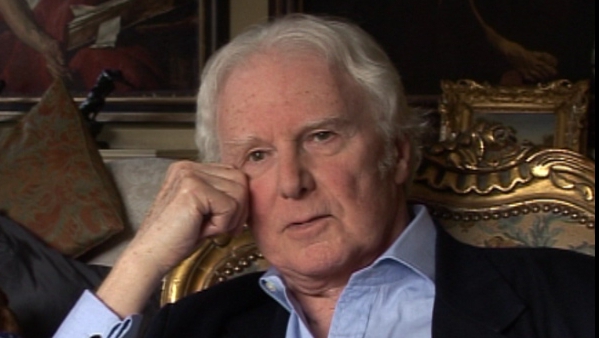NEXT STORY

Always the outsider
RELATED STORIES

NEXT STORY

Always the outsider
RELATED STORIES


|
Views | Duration | |
|---|---|---|---|
| 71. Standing up for Anthony Blunt | 380 | 04:11 | |
| 72. The real achievements of Anthony Blunt | 365 | 05:15 | |
| 73. Punished by the Establishment for supporting Anthony Blunt | 275 | 06:06 | |
| 74. Always the outsider | 231 | 03:28 | |
| 75. Into the unknown: a holiday in Cadaqués | 218 | 03:21 | |
| 76. Meeting Salvador Dalí over a slab of offal | 249 | 06:40 | |
| 77. Dinner with the Dalís | 229 | 05:49 | |
| 78. Salvador Dalí's eccentricities | 274 | 03:46 | |
| 79. Doing a Dalí | 196 | 04:44 | |
| 80. A relationship with Claudio Corvaja | 214 | 02:48 |


Well, Anthony had done a great deal for me, and the least I could do when this crisis occurred in the late autumn of 1979 was an old-fashioned thing: stand by my friend. Anthony needed to escape from his flat in… near Marble Arch, because the journalists were already gathering outside like wolves, and I did get him out and I drove him to stay with another friend, and his instruction to me was, diversionary tactics.
And I have to say that diversionary tactics cost me a great deal. They were physically draining, they were emotionally draining, they went on for months, having to deal with angry journalists, having to fend off accusations which were manifestly untrue and so on and so on. And what was most difficult was that, almost without exception, the American museums for which I had been working, withdrew their employment. That’s partly due, not to the directors and curatorial staff of the museums, but almost entirely due to the fact that they have boards of trustees and they have committees which are in charge of the American system of buying things from museums that you, a rich man, might say, well, I will buy that. I know the museum wants it and it hasn’t got the money. I will buy it. And you might keep it until your death, but at your death it will then revert to the museum. So everybody’s happy. But it means that people who sat on boards and committees were extraordinarily generous, and were expected to be generous. They were also very largely extremely conservative. And the whiff of communism, that by association was attached to me, they could not tolerate. So one by one by one, I was getting the letters or the telephone calls saying, you know, drop out for a year or two. Well, you can’t drop out for a year or two. If you do that, somebody else takes over, and then you can’t push them out because you want to come back. And in any case, what are you going to do in the year or two, when there is no job and there is therefore no money?
It didn’t matter to the few German museums for which I was working. It didn’t matter for the Swiss museums. It certainly didn’t matter for the people in South Africa, for whom I was working, but the final straw was the American authorities withdrawing my visa. Because you then had to have a visa to go to America, and I was going five times a year, and suddenly couldn’t go at all. And so part of my life, a very large part of my life was suddenly wiped out. And I didn’t know… you know, it was another… I was that much older than I had been when I left Christie’s. There was no question of saying, well, I’ll go back to my scholarship and write my thesis now. I didn’t have the money to sustain myself. I couldn’t think of any alternative career. There was no way of joining a firm. I was soiled goods, you know. If, in the extremely unlikely circumstance of being taken on as an advisor or whatever to a London dealer, it might have ruined that London dealer’s reputation, or at least affected it seriously for a year or two. So nobody was going to do that.
And then suddenly I had a letter from… oh God, I can’t remember her name. The newly appointed editor of a magazine called Tatler. And she asked me to become their art critic. And I was to write ten columns a year and be paid £100. And I said, 'Yes'. And my first experience as Tatler’s art critic was to go to the Tate Gallery’s exhibition devoted to Salvador Dalí. And the normal thing if you go to a gallery exhibition is that the gallery gives you the catalogue, and I asked for a copy of the catalogue and I was told that I was not important enough to be given one.
Born in England, Brian Sewell (1931-2015) was considered to be one of Britain’s most prominent and outspoken art critics. He was educated at the Courtauld Institute of Art and subsequently became an art critic for the London Evening Standard; he received numerous awards for his work in journalism. Sewell also presented several television documentaries, including an arts travelogue called The Naked Pilgrim in 2003. He talked candidly about the prejudice he endured because of his sexuality.
Title: Punished by the Establishment for supporting Anthony Blunt
Listeners: Christopher Sykes
Christopher Sykes is an independent documentary producer who has made a number of films about science and scientists for BBC TV, Channel Four, and PBS.
Tags: Tatler, Christie's, Tate Gallery, Anthony Frederick Blunt, Salvador Domingo Felipe Jacinto Dalí i Domènech, Salvador Dalí
Duration: 6 minutes, 6 seconds
Date story recorded: April 2013
Date story went live: 04 July 2013